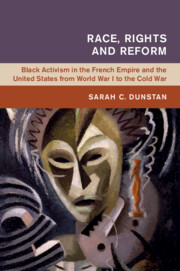 Race, Rights and Reform
Race, Rights and Reform Published online by Cambridge University Press: 01 March 2021
The post-war era began with optimism and the hope of liberty for all but it did not last. Between 1945 and 1947, the atrocities of the Nazi death camps received significant public attention in the United States. Very quickly, however, the horror was assimilated into a narrative of a particular Nazi identity, rooted in flawed domestic politics. This chapter charts the ways that black intellectuals, caught at the crossroads of race and republican values which enmeshed in the Cold War clash between communism and capitalism, fought against “an American brand” of fascism to realize the democratic potential of the French Union and the United States. Thinkers such as Aimé Césaire, Claude McKay and Langston Hughes – all of whom had compared Nazism with US Jim Crowism and European colonization during the war - were quick to point to the hollowness of a victory rhetoric while there were no universally guaranteed rights. As far as they were concerned, the end of World War II, far from vanquishing fascism once and for all, had merely shifted the battle lines. These men and women aired their views through a variety of mediums, from speeches on the Senate floor through to poetry and political petitions. This chapter brings these diverse sources together, often for the first time, to illustrate their visions for a post-war order.
To save this book to your Kindle, first ensure [email protected] is added to your Approved Personal Document E-mail List under your Personal Document Settings on the Manage Your Content and Devices page of your Amazon account. Then enter the ‘name’ part of your Kindle email address below. Find out more about saving to your Kindle.
Note you can select to save to either the @free.kindle.com or @kindle.com variations. ‘@free.kindle.com’ emails are free but can only be saved to your device when it is connected to wi-fi. ‘@kindle.com’ emails can be delivered even when you are not connected to wi-fi, but note that service fees apply.
Find out more about the Kindle Personal Document Service.
To save content items to your account, please confirm that you agree to abide by our usage policies. If this is the first time you use this feature, you will be asked to authorise Cambridge Core to connect with your account. Find out more about saving content to Dropbox.
To save content items to your account, please confirm that you agree to abide by our usage policies. If this is the first time you use this feature, you will be asked to authorise Cambridge Core to connect with your account. Find out more about saving content to Google Drive.